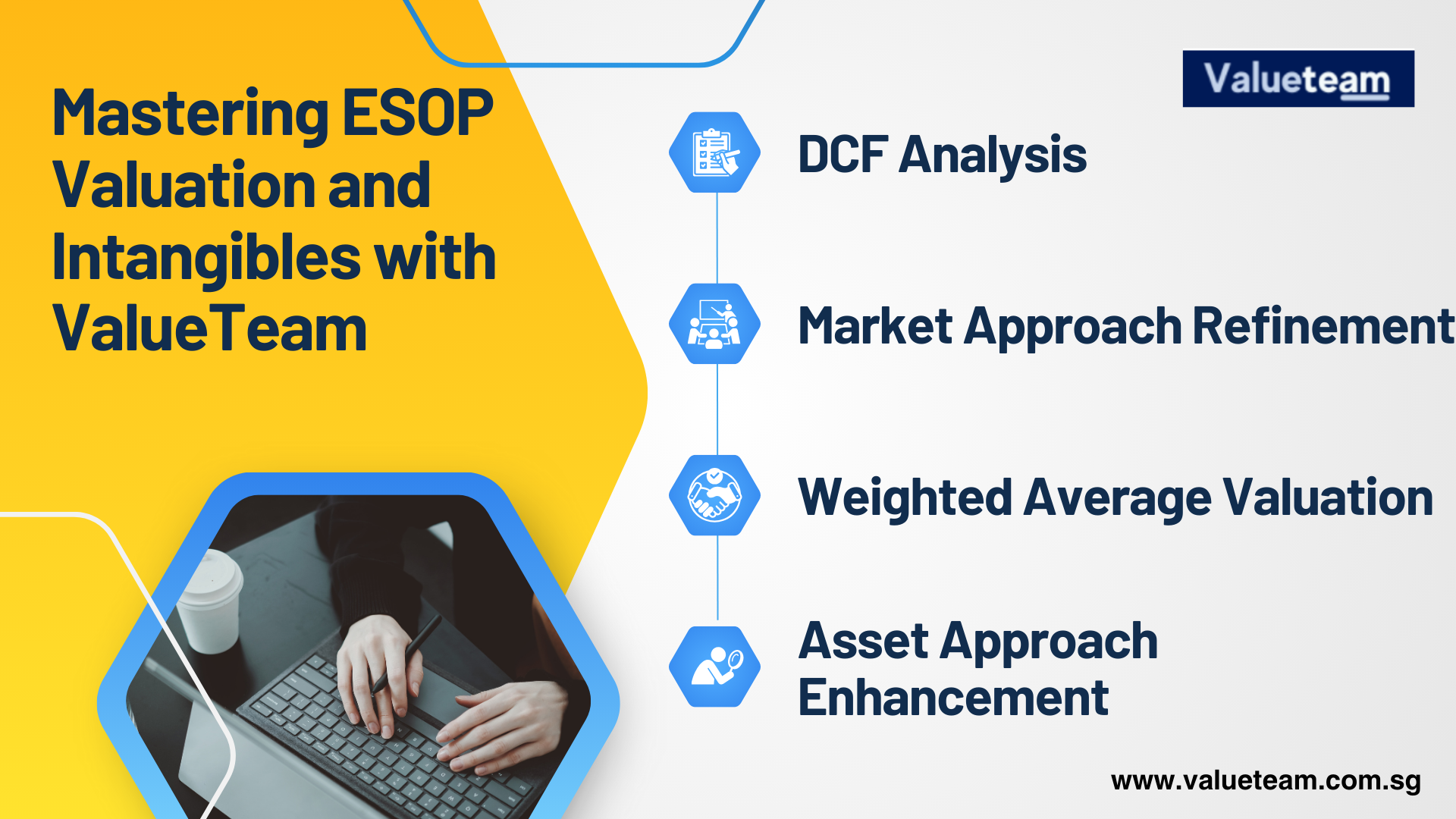Employee Stock Ownership Plans (ESOPs) are a valuable tool for fostering employee ownership and motivation. However, conducting a precise ESOP valuation, especially when it involves intangibles valuation services and comprehensive company valuation, can be challenging. That’s where ValueTeam steps in to guide you through the process. In this step-by-step guide, we’ll demonstrate how ValueTeam can help you navigate ESOP valuation while emphasizing the critical aspects of intangibles and company valuation.
Step 1: Define the ESOP Valuation Purpose
- ValueTeam’s experts begin by understanding your ESOP’s purpose. Whether it’s for annual compliance, a transaction, or strategic planning, we tailor our approach accordingly.
Step 2: Data Gathering and Analysis
- ValueTeam’s skilled analysts gather comprehensive data, including financial statements, historical performance, and industry benchmarks, to ensure that your ESOP valuation analysis is built on a solid foundation.
Step 3: Selecting the Right Valuation Methodology
- Our experts help you choose the most suitable valuation methodology based on your company’s unique characteristics. We evaluate which approach – Market, Income, or Asset – aligns best with your goals and circumstances.
Step 4: Expert Intangibles Valuation
- At ValueTeam, we understand the growing significance of intangible assets. We employ advanced methods to evaluate intangibles, ensuring they’re not overlooked in your ESOP valuation.
Step 5: DCF Analysis
- For Income Approach valuations, we conduct a meticulous Discounted Cash Flow (DCF) analysis. Our experts project future cash flows and employ precise discounting techniques, incorporating intangibles where necessary.
Step 6: Market Approach Refinement
- In the Market Approach, ValueTeam refines metrics, such as price-to-earnings ratios or enterprise value-to-EBITDA, by considering intangible assets, making comparisons more accurate.
Step 7: Asset Approach Enhancement
- For Asset Approach valuations, we evaluate the net asset value while considering both tangible and intangible assets, ensuring a comprehensive company valuation.
Step 8: Weighted Average Valuation
- ValueTeam’s professionals assign appropriate weights to each valuation method, accounting for intangibles and ensuring a well-rounded view of your company’s worth.
Step 9: Intangible Asset Recognition
- We understand that intangible assets, like intellectual property and brand value, can significantly impact your company’s valuation. ValueTeam’s experts ensure their proper recognition by applying proven methodologies on how to value tangible and intangible assets accurately and in compliance with industry standards.
Step 10: Prepare the Valuation Report with ValueTeam
- Our team compiles all analyses, calculations, and methodologies into a detailed valuation report that adheres to industry standards, ensuring compliance and clarity.
Step 11: Independent Validation
- ValueTeam goes the extra mile to ensure credibility. We recommend independent validation by qualified professionals, guaranteeing accuracy.
Step 12: Transparent Communication
- ValueTeam helps you communicate the valuation results to ESOP participants, management, and relevant authorities transparently, fostering trust and alignment.
Step 13: Regular Updates with ValueTeam
- ESOP valuations aren’t static. ValueTeam advises on regular updates, especially in the face of significant changes in your company’s performance, structure, or the regulatory landscape.
By choosing ValueTeam for your ESOP valuation needs, you ensure that the process is thorough, accurate, and considers critical aspects like intangibles valuation and comprehensive company valuation. Our experts understand the nuances of ESOP valuation and are equipped to guide you through every step, ultimately enhancing the value of your ESOP plan and the motivation of your employees. Trust ValueTeam to be your partner in ESOP success.
How Strategic ESOP Valuation Boosts Employee Engagement and Retention
The strategic ESOP valuation not just helps in compliance, it is an effective instrument to add employee buyer engagement and retention. When employees see how their ESOP stock is properly and evenhandedly priced, it creates a greater feeling of ownership and belief in the long-term possibilities of the plan. The feeling of fair value will give the participants the urge to contribute actively to the success of the company which has a direct bearing on their share price. Constant update and review confidence is maintained with advisory services, which are independent. Eventually, properly structured and controlled ESOP valuation can turn such plan into vibrant scheme that not only boosts employee morale but also leads to greater loyalty and, in general, contributes to the process of retaining talent which is of vital importance to maximize employee wealth through ESOPs and long-term organizational growth.
Also Read :- Startup Valuation, Intangibles Valuation, Company Valuation, Business valuation Singapore, Purchase price allocation

